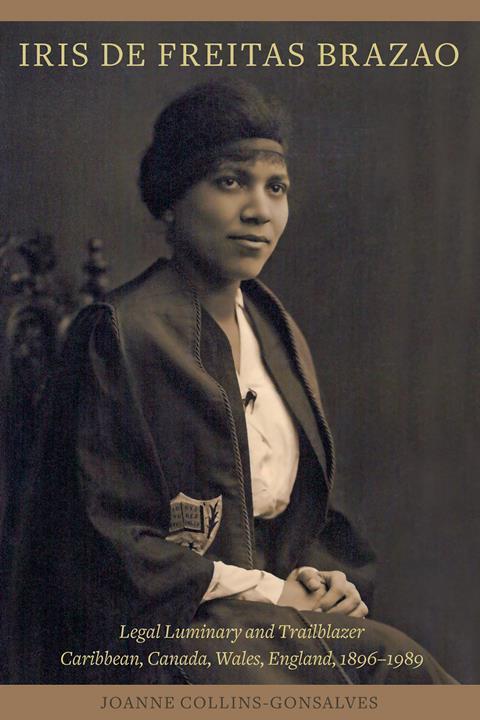Iris de Freitas Brazao was a legal luminary who shattered the profession’s glass ceiling in the Caribbean. She had the distinction of being the first woman barrister-at-law in the Commonwealth Caribbean.

It is 100 years since Iris first graduated from the University of Oxford, a remarkable achievement to be celebrated. Matriculating in 1923 for the Bachelor of Arts, her courses for the BA included Roman Law, the English Legal System, Constitutional Law and Legal History, International Law and Roman-Dutch Law. Knowledge of Roman Dutch-Law was particularly important as this served as the precedence for many rulings in her home country of British Guiana (now Guyana). Significantly, Iris was taught by Dr Ivy Williams, the first woman to be called to the bar in England and a professor at St Anne’s College at Oxford. Iris was originally enrolled as a Society of Oxford Home-Student (now St Anne’s College). Notably, Iris’s 1925 graduation occurred 10 years before Dr Merze Tate, who in 1935 became the first African-American woman to graduate from Oxford.
Iris continued her studies at Oxford and was awarded an academic scholarship. In 1926, she graduated once again, this time with a postgraduate qualification, the Bachelor of Civil Law.
Before Oxford, Iris studied briefly at the University of Toronto in 1918, and at Aberystwyth University, Wales, from 1919 where she later graduated with both a BA (1922) and an LLB (1927). Her English law professor at Aberystwyth University (then University College of Wales (UCW)) was T. Arthur Levi, who was an Oxford graduate. He noted in June 1923 that: ‘Iris has proved one of the best law students we have ever had in the college.’ Iris was elected president of the UCW Women’s Sectional Council and vice president of the Wales Students’ Representative Council from 1922 to 1923. Her academic legal studies concluded in 1929 when she was called to the bar at the Honourable Society of the Inner Temple.

Iris’s extensive qualifications are of particular interest. During my research, I found the interconnected nature of her studies in England and Wales. I noted in my recent book, Iris De Freitas Brazao, Legal Luminary and Trailblazer: Caribbean, Canada, Wales, England 1896-1989, that ‘the 1920s for Iris de Freitas was an academic season of study and scholarship across continents amid systemic racism and sexism, as well as the aftermath of the first world war and the onset of the 1918-1920 influenza pandemic. She emerged at the end of the 1920s with five impressive qualifications and became the first woman barrister-at-law called to the bar in the Commonwealth Caribbean. Even more remarkable was that Iris completed most of these studies consecutively and at times intertwined.’ The fortitude and strength that it took for her to persevere while completing her studies despite the challenges is phenomenal. She returned to practise in British Guiana in 1929 to much acclaim.
Her many accomplishments include being the first woman in British Guiana to prosecute a murder trial in 1932. This was 16 years before Helena Normanton led the prosecution of the first murder trial by a woman barrister-at-law in England.
Significantly, Iris was also the first woman of African descent to graduate from the University of Oxford and the Honourable Society of the Inner Temple. Iris also served as: the first female Crown prosecutor in British Guiana; the only woman to be a signatory to registration of the British Guiana Workers’ League; the only female member of the British Guiana Franchise Commission in the 1930s; and the first female member of the British Guiana Public Service Commission in the 1950s. She died in Georgetown, Guyana, in 1989. Guyana’s attorney general Keith Massiah stated that her many firsts were ‘sufficient by [themselves] to win her enduring fame’.
The words of the late Honourable Desiree Bernard, former chancellor of Guyana, are most fitting: ‘Iris had good reason to be proud of the progress that women have made in the legal profession. Women are now prosecutors, magistrates and judges, positions which women in the early years of this century [20th] would never have dreamt of holding.’ The contemporary period is now considered the golden age of women in law.
In the UK, as the Law Society celebrates its 200th anniversary this year, it is fitting to note that Dr I. Stephanie Boyce FKC, FRSA served as the first Black female president of the Society from 2021/22, while this year Barbara Mills KC made history when she was appointed as the first Black chair of the Bar Council. Iris de Freitas Brazao would likely have been very proud.
At the Aberystwyth University Hugh Owen Library, a room was named in her honour in 2016. It is my hope that Iris will also be honoured by her alma mater the University of Oxford in this the centenary year of her graduation.
Dr Joanne Collins-Gonsalves is a fellow of the Royal Historical Society and managing director of the Historical Research International Inc, Canada. This article was adapted from her recent book Iris De Freitas Brazao, Legal Luminary and Trailblazer: Caribbean, Canada, Wales, England 1896-1989































No comments yet